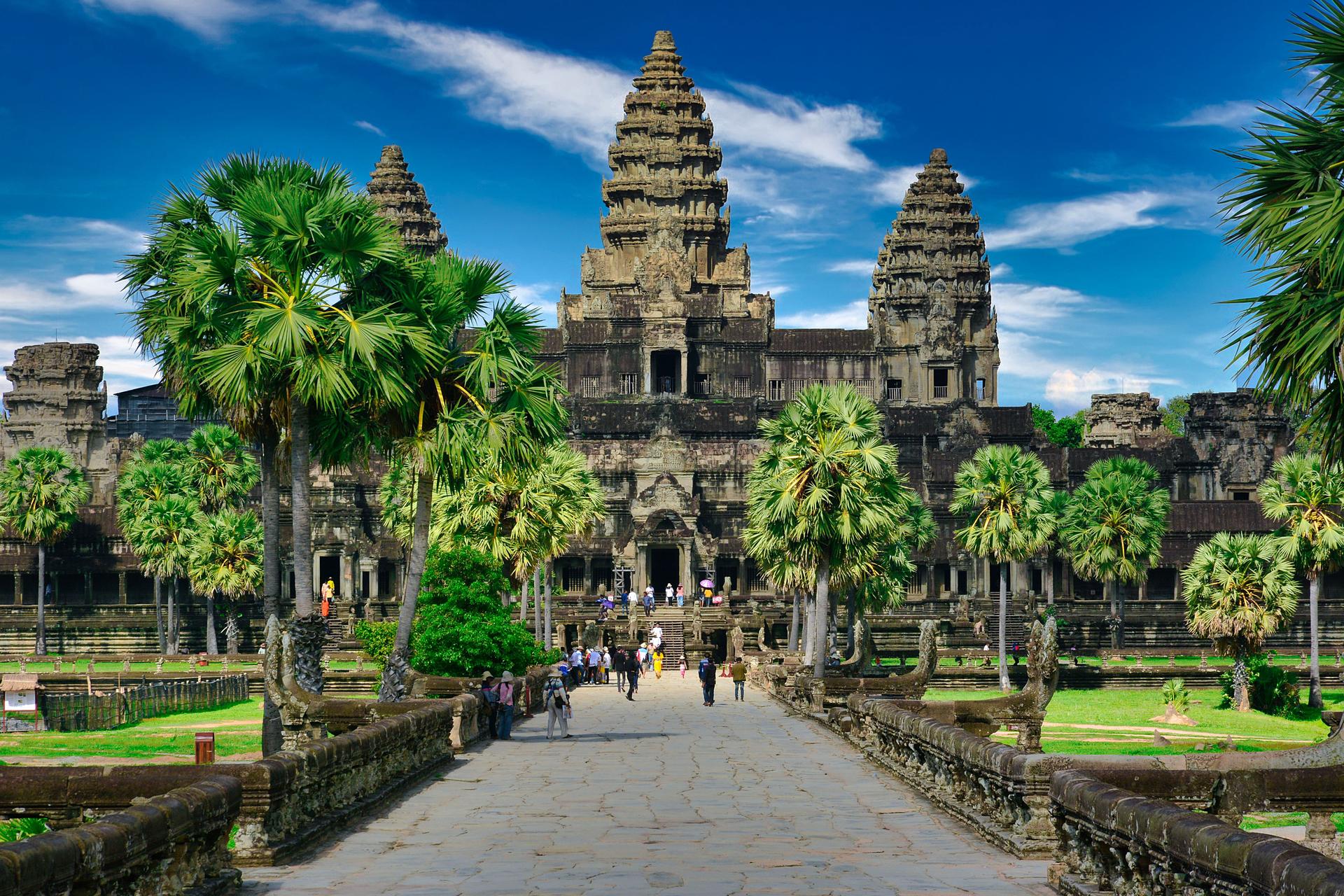Cambodia🇰🇭

Cambodia is a Southeast Asian nation located on the Indochinese peninsula. It shares its borders with Thailand to the west and northwest, Laos to the northeast, and Vietnam to the east and southeast and has an extensive coastline facing the Gulf of Thailand in the southwest. Throughout centuries, Cambodia went through a lot of cultural changes, but the most notable is Angkorian era, which culminated in the construction of the temple of Angkor Wat, a symbol of Cambodia. The country suffered a massive blow during the Khmer Rouge regime, but it has been rebounded with the development in its infrastructure and an increase in tourism. Cambodia is notable for its rich history of traditions and attractions, such as the famous Siem Reap city, Preah Vihear, Koh Ker, Tonlé Sap, etc.
⚠️Things you should avoid⚠️
- Avoid showing disrespect toward the local culture and religion, especially Buddhism, which is practiced by the majority of Cambodians.
- Avoid late-night travel in isolated areas which can be risky due to banditry.
- Avoid public demonstrations or political gatherings, which can suddenly turn violent.
- Avoid criticisms of the government or the monarch, which could be interpreted as defamation.
- Avoid showing off your wealth or expensive items, as it may attract pickpockets.
- Avoid exploring remote areas and historical sites without a knowledgeable guide. There are still some areas that have unexploded ordnance from past conflicts.
- Avoid drinking tap water, as the quality can be poor.
- Avoid involvement in drugs of any kind. Drug laws in Cambodia are strict, and conviction can lead to lengthy imprisonment.
- Avoid accepting rides from strangers or unofficial taxis, as there have been reports of robberies and assaults.
- Avoid disrespect of local customs and traditions to ensure positive interaction with locals.
Overall
6
Crime 🔫
6
Although Cambodia has a low crime rate compared to its neighbors, it is advisable to be cautious, especially in major cities like Phnom Penh, where pickpocketing and bag snatching are not uncommon. Night travel in isolated areas should be avoided due to the risk of banditry.
Terrorism 💣
8
Cambodia generally doesn't suffer from large scale terror attacks. The government has been active in suppressing any potential terror threats. There haven't been substantial terror incidents in recent past.
War ⚔️
9
The last notable conflict in Cambodia was the Cambodian-Vietnamese War, which ended in 1989 and ever since the country has remained peaceful.
Natural Disasters 🌊
6
Cambodia is prone to several natural disasters including monsoonal floods and droughts. The most notable event was the severe flooding that occurred in 2011, affecting over 1.2 million people.
Medical Care 🏥
5
While the state of medical care in Cambodia is improving, it still lags behind international standards. The healthcare in remote areas is especially challenging.
Tap Water Quality 💧
4
The quality of tap water is generally poor in Cambodia. Bottled water is widely available and recommended for direct consumption.
Disease Burden 🤒
5
Malaria, dengue fever, and Japanese encephalitis are endemic in Cambodia, especially in rural areas. However, the government has been aggressive in fighting these diseases.
Corruption 💸
3
Corruption is a major issue in Cambodia, with it being widely prevalent across various sectors of the public administration, causing an adverse impact on the socio-economic development of the country.
Safety for Women ♀️
6
Women can generally travel safely in Cambodia, but extra care should be taken when traveling alone, especially at night.
Safety for Queer People 👬
6
Cambodia is considered one of the more progressive countries in Southeast Asia when it comes to LGBT rights. However, some discrimination may still exist.
Censorship 📺
5
There have been instances of censorship commonly seen in the regulation of media, especially on sensitive political or social issues.
Public Transportation 🚌
6
The public transportation system in Cambodia is improving, but it's still limited in rural areas. Major cities are served by a network of buses, taxis, and tuk-tuks. The roads can be poor in condition with unreliable driving practices.
Other useful information
🔒 How safe is it?
Cambodia is generally safe for travel with a relatively low crime rate, but like anywhere else, it's essential to be cautious and aware of your surroundings. Keep valuables secure and stay vigilant especially in crowded public places. Always respect local laws and customs to avoid any misunderstanding.
🏰 Embassies in this Country
Numerous foreign embassies are located in the capital, Phnom Penh, including the U.S., Australian, British, Canadian, French, and German embassies.
💉 Recommended Vaccinations
Hepatitis A and B, typhoid, rabies, Japanese encephalitis, and routine vaccines are recommended for most travelers. Malaria vaccination is advised for those traveling to rural areas.
🐍 Dangerous Animals
Mosquitos transmitting dengue and malaria pose risks in the country, especially in rural areas. Venomous snakes, such as King Cobras and Python reticulatus, are also present.
🛂 Visa Requirements
For most countries, visa on arrival is available. E-visa can also be obtained online prior to travel.
💲 Currency
The official currency is the Cambodian Riel (KHR), but US dollar is widely accepted. Money can be exchanged at banks, hotels and authorized money changers.
💳 Credit Card Acceptance
Credit cards acceptance in Cambodia is limited to large hotels, restaurants, and businesses in tourist areas.
🧑🏭 Is it possible to work and travel in this country?
Work and travel opportunities are available in Cambodia, especially in the fields of tourism, teaching English, and volunteering.
💵 Cost of Travel and Living
Cambodia is on the lesser expensive side for travelers with cheap accommodation, food and travelling options.